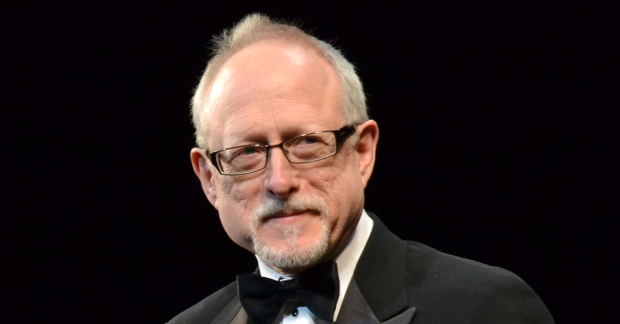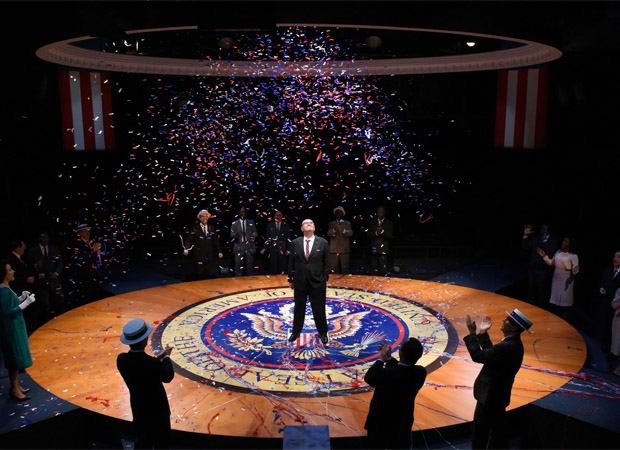Robert Schenkkan Goes All the Way With LBJ Sequel The Great Society
Schenkkan discusses the tragic side of his two-part tale, which has its Arena Stage premiere in February.
In Robert Schenkkan's Tony-winning drama All the Way, Lyndon Banes Johnson rose to the presidency following the assassination of John F. Kennedy. After a hard-fought election campaign that takes place over the course of the three-act work, the curtain comes down on Johnson's legitimate, landslide victory in 1964.
But that was just the beginning, and Schenkkan admits he would have been "very disappointed" if he didn't get explore what happened next. The Great Society, which premiered in 2014 at the Oregon Shakespeare Festival, is named after Johnson's ambitious plan to fight the war on poverty. But there was another war on hand, one taking place overseas, and it was spinning rapidly out of control.
Beginning February 2, audiences at Arena Stage will get to see this second half of the LBJ story, one that couldn't be more different from its predecessor. "All the Way is a drama," Schenkkan says, "and The Great Society is a tragedy."

(© David Gordon)
Where is Lyndon Johnson in The Great Society?
LBJ has won his historic landslide victory and a substantial majority in both houses, and launches into this incredibly ambitious remaking of American society. The number of significant legislations in the first two-and-a-half years of his term is pretty unmatched: Medicare, Medicaid, the Voting Rights Act. The list goes on and on. And then, of course, is Vietnam. How did this extraordinarily gifted politician, so competent and ambitious, fail so spectacularly in Vietnam?
Is that why you describe the play as a tragedy?
The tragic part is that he failed knowing that he was failing. You can go online now and listen to phone conversations that LBJ tape-recorded that are being archived at the University of Virginia. You can hear a conversation between LBJ and Senator Russell from November 1964 about Vietnam, in which LBJ bemoans the fact that he doesn't know how to get out of it. He will then go on to double down and lie to the American people knowing that it's wrong and that it will completely damage his domestic agenda, the thing he cares about most. It's not only a personal tragedy and a tragedy for the country, but it's also a tragedy for the people of Vietnam and Southeast Asia.
When you first started researching the Johnson presidency, was it your intention to write more than one play?
I would have been very disappointed had I not been able to get to the second half of the story, but there was no discussion of me writing the second play as part of the commission from Oregon Shakespeare Festival for All the Way. Shortly after beginning writing, I was approached by Seattle Rep to commission the sequel. I wanted to involve Oregon Shakespeare Festival, so it became, in essence, a joint world premiere between the two theaters.
We did The Great Society first in Ashland, with Jack Willis heading the company, and then we moved the whole thing to Seattle, where, for the first time anywhere, both plays ran together in repertory. Now, Arena audiences who saw Jack Willis's splendid LBJ in All the Way in 2016 will get to see him as LBJ in The Great Society. He's an extraordinary actor and the part fits him like a glove.
Though The Great Society has had a number of productions, the Arena staging debuts a new version, which pares the work down from three acts to two. What was the motivation behind the edits?
A three-act play is a little bit unusual these days. The length is a little bit challenging. [Artistic director] Molly Smith and I have been colleagues for a long, long time. One of the good things about Molly and Arena Stage that bears repeating is that they're not just interested in a world premiere. She's always been very supportive of playwrights and the arc of a particular play. I think her feeling was that it would be more effective to tell this story in a slightly more compressed version.
I've cut 20-plus minutes. I was not entirely convinced it was the right thing to do to begin with, but I was pleasantly surprised with the results on the page. The aesthetic consequences seemed to be a very positive bearing down on LBJ's arc through the play, without a significant sacrifice of the other story lines. It's been interesting to be able to reexamine and change it, and I'm very appreciative of Molly for giving me this chance.

(© Stan Barouh)
Are there parallels between the presidency of LBJ and the current political climate?
What's interesting about Lyndon Johnson is that his virtues and vices were all outsized. He succeeded greatly and he failed greatly. We tend to idealize or demonize, often one leading to the other, without really a close or comprehensive understanding of what a difficult job it is.
We live in a world that LBJ created, and I don’t think that is hyperbole. So much of his legislation and resulting social programs are now part and parcel of everything in America. These are the issues that we continue to argue fiercely, savagely, and sometimes with very much the same rhetoric.
We are, today, mired in a longstanding foreign war that was never officially declared, over which there is much confusion as to its purpose, and are seemingly unable to extricate ourselves from it. That sounds familiar. We are in another moment of the longstanding American nightmare of racism and civil rights, and specifically voting rights. We are once again fighting about healthcare in this country — who should have it and how should it be delivered, and what part the federal government should play. All of these were hot-button issues from 1964 to '68, and here we are, still fighting. It's still extraordinarily relevant.










